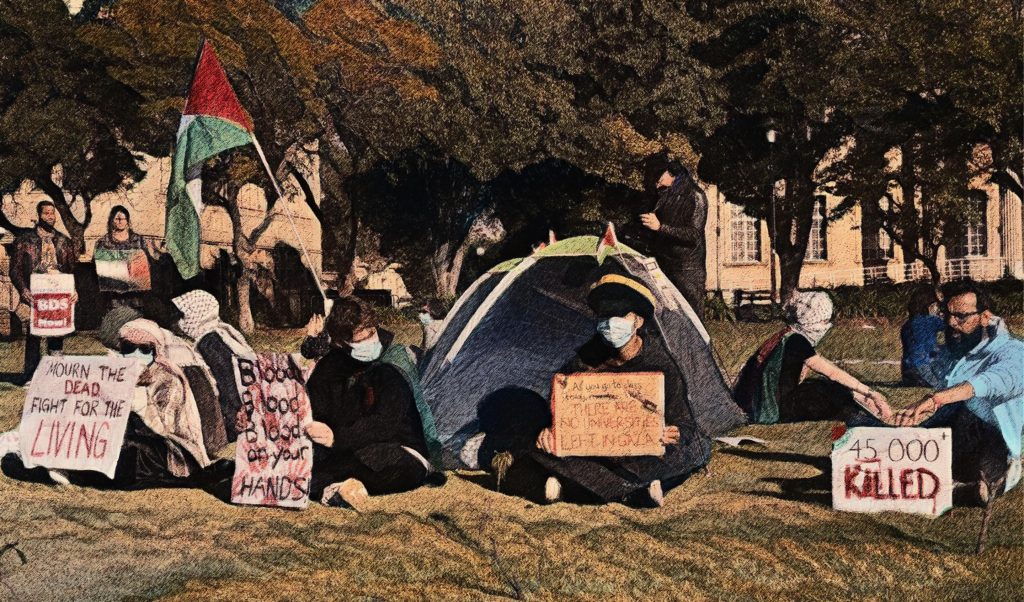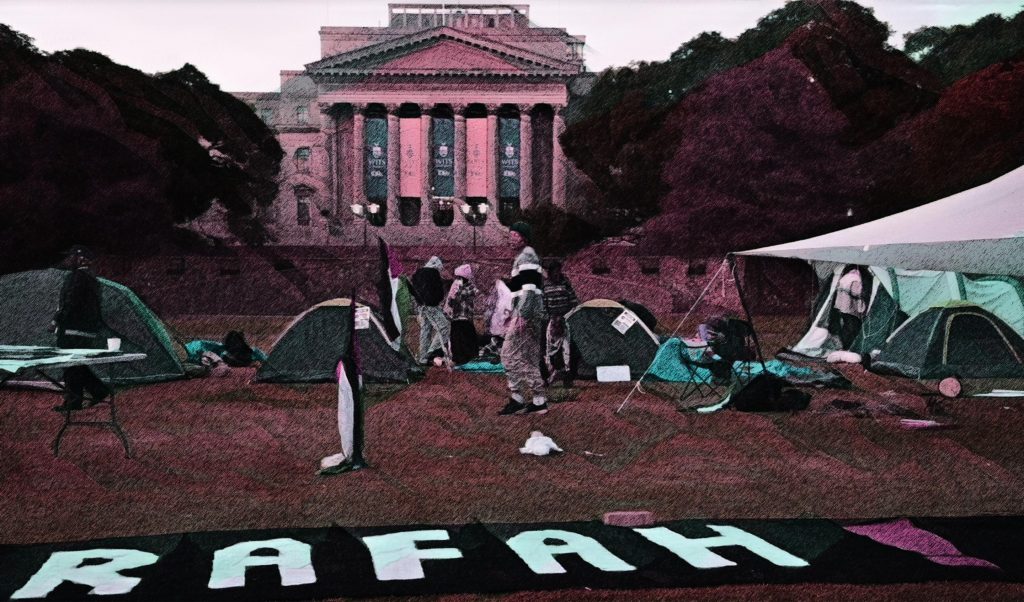There is probably no other country in the world where the struggle of Palestinians can be felt and understood as much as in South Africa.
The late Nelson Mandela famously said: “Our freedom is incomplete without the freedom of Palestinians”.
On 13 May, the students at the Wits Liberated Zone, at Wits University in Johannesburg, launched their Instagram profile to reveal their activities and struggles.
In the country that brought the Genocide case at the ICJ against Israel, the student movement has been organising its response in support of the Palestinian struggle, highlighting the deep connections to the movement one that led to the end of Apartheid in the country. Nelson Mandela also had a personal bond with Yasser Arafat and the relationships between the two peoples and countries continues in the present.
Tunisian-American writer, scholar and activist Jamila Hammami, told UntoldMag about the perspectives from the US whence the student movement erupted on 17 april at Columbia University to spread to campuses across the globe. “This global resistance and solidarity with Palestine is inspiring,” she explains. “Watching this intergenerational struggle and level of solidarity is incredible. Still, it is also absolutely heartbreaking to realize that it took a full-blown genocide for us to get there. Everyone has a role in this movement, not just students, talking to your family or boycotting Starbucks matters. People realize how interwoven this is, how much broader it is, and how much capital plays a role”.

UntoldMag spoke with three students involved with the Wits Liberated Zone: A. Herold, Firdous, and Zehra.
“My activism, in an intersectional way, began in Grade 11, when they introduced us to apartheid on a much deeper level. We started studying the Truth and Reconciliation Commission and this is a complicated history for South Africans, for Black South Africans, with the horrors of the apartheid system” says Firdous. “Afterwards, we moved into a democratic South Africa, but when you think about that, you realize the level of injustice in the world and it makes you angry.” For Firdous, this was the point when it became more intersectional for her and when she realized that it is important to connect with other movements.
“It is all well and good to fight a particular struggle, whether it is patriarchy, imperialism…but what we need to realize is that all our struggles are interconnected and there is so much power in that”, she adds.
“It all comes back to colonialism, apartheid, and systematic injustice” continues Firdous, “it is about realizing that we should be angry and to target what we are angry at, and finally, to ask how we use our anger as a driving force so that we can dismantle these systems”.
This feeling is echoed by Zehra. “Sometimes stories of this kind of oppression are very close to us. I saw victims of apartheid, colonialism, western imperialism.” Zehra is from Pakistan, a country with a long history of western imperialism. “Seeing my homeland being wrecked like this, down to those imperialist and colonialist values, and then coming to South Africa and encountering those again against my peers and friends, all around you does bring up a certain degree of anger, and your anger empowers and motivates you, like a driving force to create change,” she explains.

Zehra also points out that while Pretoria did indeed bring the genocide case at the ICJ against Tel Aviv, the ANC government has not sanctioned Israel economically, as there is still trade between the two countries, as well as undisclosed trade deals when it comes to weapons. Further, the government has not adhered to BDS.
“South Africa is a very diverse nation, with distinct communities. This means very different conversations on Palestine are being held. There is a lack of awareness that we have encountered at our university specifically. Students have an idea of what is going on in Gaza but they do not understand the true struggle and how we can also show up for this,” she says .
For A.Herold the conversation is beyond the universities and the government, rather it is about the living conditions faced by many South Africans: “In the townships a lot of people do not know what is going on or the extent of it. They are dealing with a lack of electricity, jobs, water….”
“People do not care and I know everyone has to struggle, but, all in all, without the freedom of the people of Palestine, we will also not be free”, he continues. “When South Africa was being boycotted, the world took a stand for us, so we need to take a stand for Palestine,” he concludes.
There is a lot of power in the fact that movements in the Global South have been given some attention. “Our context is so different from Western countries. We are able to provide a more multi-layered approach here. We also struggle to mobilize, but I think that it is significant that we do things differently from the US and that the things that are possible here are not necessarily possible there and vice versa. It is very interesting to notice the differences and similarities between the two contexts”, according to Firdous.
South Africa’s government stance on Palestine could be tested by the intent of the African National Congress to form a national unity government after its first loss of a majority in 30 years. Meanwhile,n the US, the danger of a reelection of Trump may not be enough to convince Arab Americans, Muslims, youth and left-wing voters of the so-called “need” to vote for Joe Biden in November, nicknamed by many now as Genocide Joe.
What is certain though, is that this movement will not stop and that the Global South youth will find more space in the dialogue, as the Palestinian struggle speaks to all of their past and present experiences.








